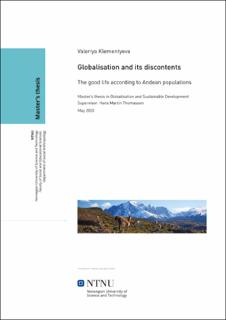| dc.description.abstract | The following thesis, written as a part of the MSc in Globalisation and Sustainable Development, is directed at studying the concept of Buen Vivir in the frames of globalisation. Due to practical limitations, the research was conducted as a desktop study with the literature review as the main method. The story of globalisation does not always conform to the fairytale of growth and convergence, rather, it is characterised by uneven development: for a few, rich countries and people, it has led to prosperity, but for the many, poor countries and people, it has led to marginalisation or even exclusion. Further to this, according to Arturo Escobar (2004), the ability to provide solutions to modern problems in the modern world has been increasingly compromised. Therefore, there is a need to find new alternatives that are breaking away from the cultural and ideological bases of development, bringing other imaginaries, goals and practices the the fore (Escobar, 2015). One of those alternatives might be Buen Vivir, which, translated to English, approximately means good life or good living, and takes its roots in the Andean indigenous thinking. To provide an example of how Buen Vivir is applied, a case of Tungurahua watershed management system was chosen. It highlights how indigenous populations design their own environmental governance by working with and sometimes against the competing visions of international NGOs, as well as how their work escalates and brings local norms of environmental management to the forefront of the global arena confronting the prevalent international norms. The reform of the watershed involved the linking of indigenous and local knowledge and political action in civic initiatives, which by the definition provided in the theoretical part of the thesis, can be described as globalisation-from-below. Therefore, Tungurahua’s watershed reform comprises a concrete example of how Buen Vivir can be manifested in reality. It showed to the world that it is possible to pursue development that does not stem from the Western ideals of individualism, a humankind and nature dualism, and a linear concept of progress rooted in material growth. | |
